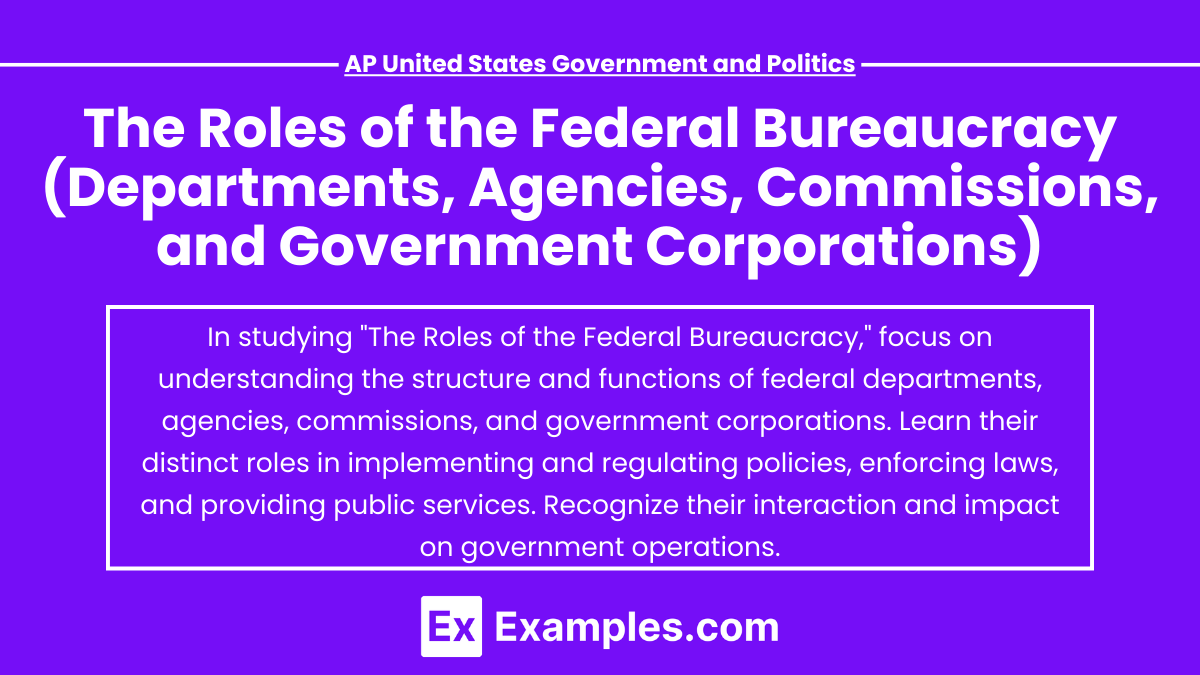The Federal Bureaucracy plays a crucial role in implementing and managing government policies in the United States. It consists of various entities, including departments, agencies, commissions, and government corporations, each with specific functions. Federal departments enforce laws and administer services, agencies handle specialized tasks, commissions regulate specific industries, and government corporations provide public services in a business-like manner. Understanding these components and their interactions helps clarify how the bureaucracy supports and executes the policies set by Congress.
Learning Objectives
In studying “The Roles of the Federal Bureaucracy (departments, agencies, commissions, and government corporations)” for AP United States Government and Politics, you should aim to understand the intricate structure and functions of the federal bureaucracy. Begin by identifying and describing the various components that make up the federal bureaucracy, including departments, independent agencies, regulatory commissions, and government corporations. Grasp how these entities are organized and how they interact within the broader governmental framework. Focus on the distinct roles and functions of each type of bureaucratic body. For example, federal departments primarily implement and enforce laws, while independent agencies may focus on specific regulatory tasks or provide particular services.
1. Departments
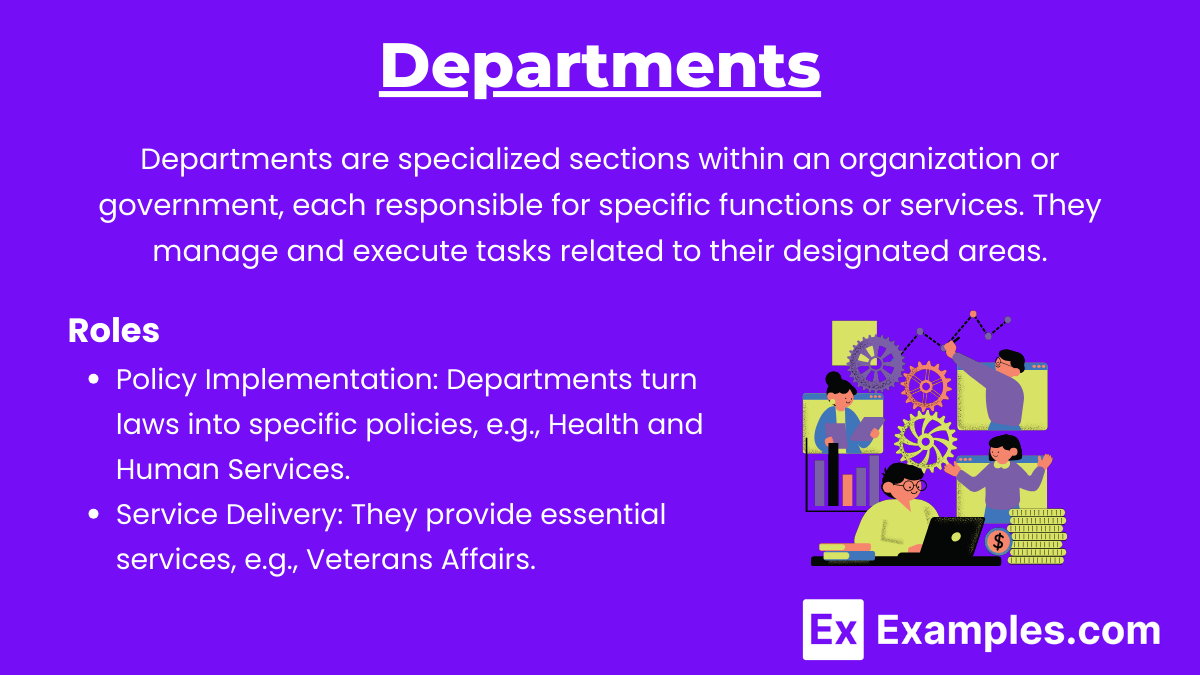
Definition: The executive departments are the primary units of the federal bureaucracy. There are currently 15 departments, each headed by a Secretary (except the Department of Justice, which is headed by the Attorney General).
Roles
- Policy Implementation: Departments translate laws passed by Congress into specific policies and regulations. For example, the Department of Health and Human Services implements public health policies.
- Service Delivery: They provide essential services to the public. For instance, the Department of Veterans Affairs offers support and services to military veterans.
- Regulation and Oversight: Departments regulate specific sectors of the economy and society. For instance, the Department of Agriculture oversees agricultural practices and food safety.
2. Agencies
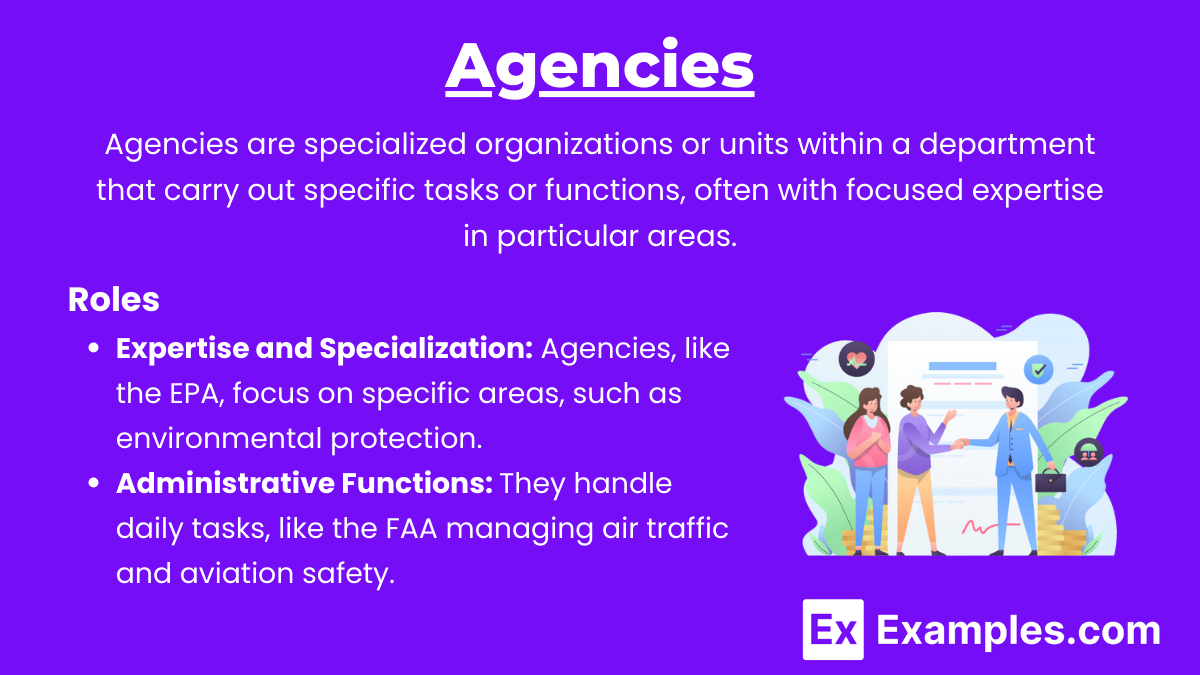
Definition: Agencies are specialized units within the executive departments that focus on specific areas of public policy or services. They can operate independently or under the supervision of a department.
Roles
- Expertise and Specialization: Agencies bring specialized knowledge to the implementation of federal policies. For instance, the Environmental Protection Agency (EPA) focuses on environmental protection and regulation.
- Administrative Functions: They handle day-to-day administrative tasks related to their areas of expertise. For example, the Federal Aviation Administration (FAA) manages air traffic control and aviation safety.
3. Commissions
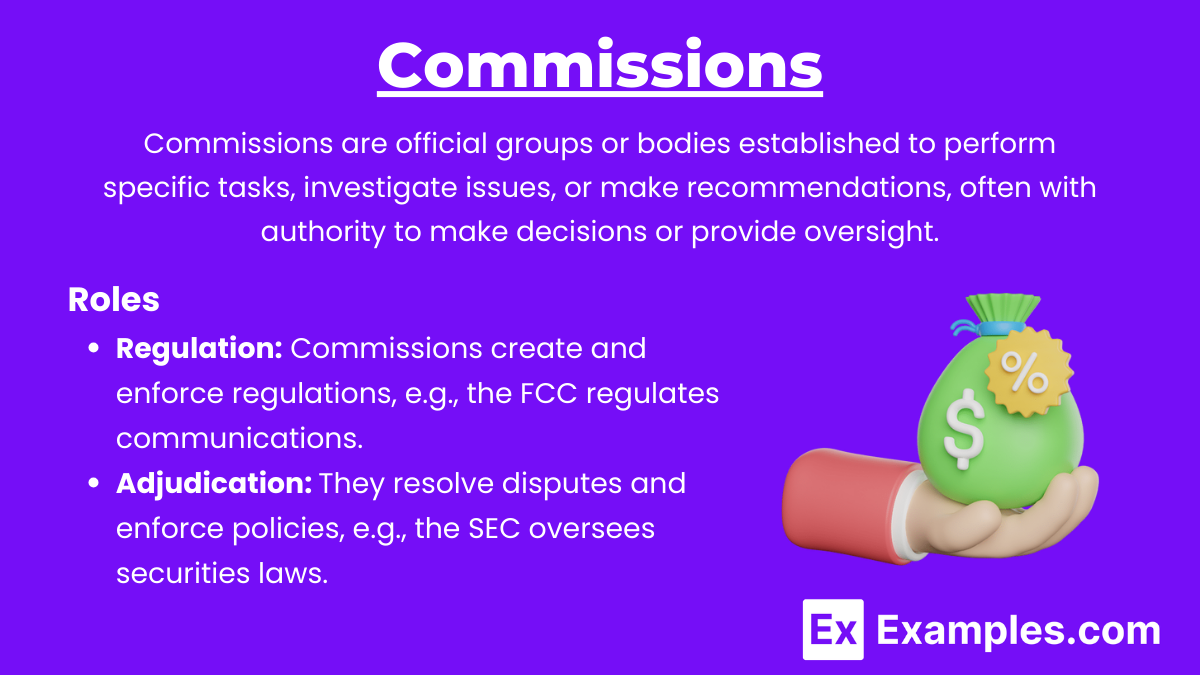
Definition: Commissions are independent agencies created by Congress to address specific issues or industries. They often have regulatory and adjudicative functions.
Roles
- Regulation: Commissions have the authority to create and enforce regulations within their jurisdictions. For example, the Federal Communications Commission (FCC) regulates interstate and international communications by radio, television, wire, satellite, and cable.
- Adjudication: Some commissions have the power to resolve disputes and enforce regulatory policies. The Securities and Exchange Commission (SEC) oversees and enforces laws related to securities and financial markets.
4. Government Corporations
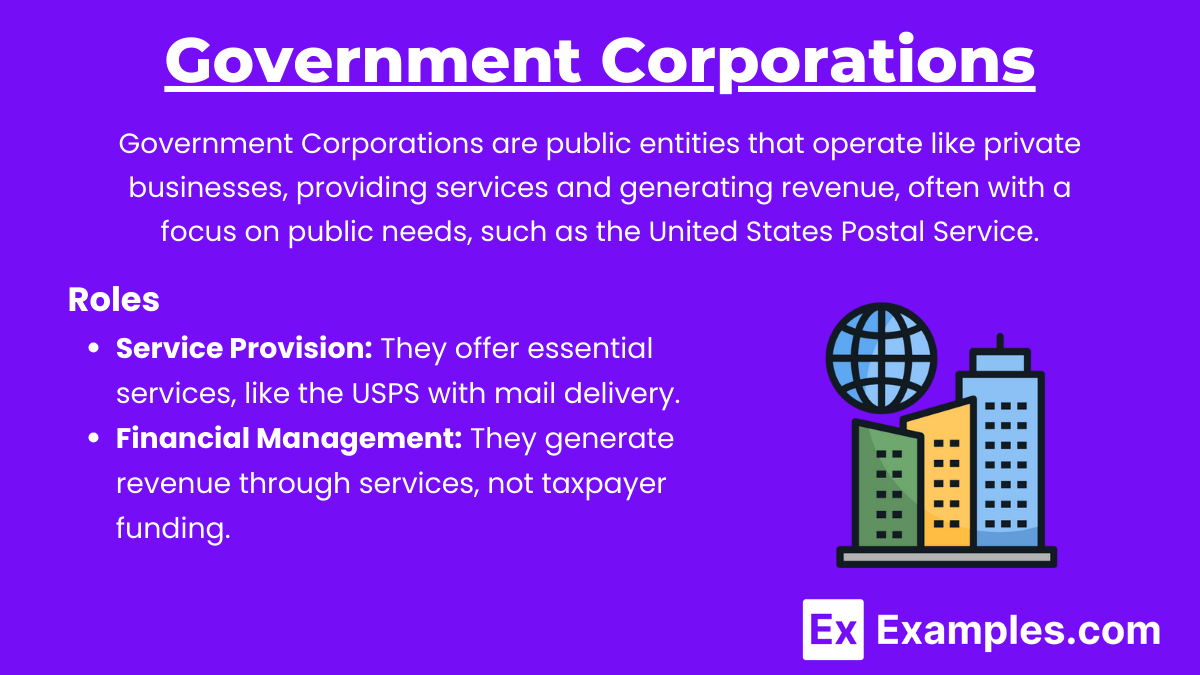
Definition: Government corporations are entities that provide a public service and operate like a private business, aiming to be financially self-sustaining.
Roles
- Service Provision: They deliver services that could be provided by the private sector but are deemed essential for public welfare. For example, the U.S. Postal Service (USPS) delivers mail and packages across the country.
- Financial Management: Unlike most federal agencies, government corporations are expected to generate their own revenue through their services rather than relying on taxpayer funding.
Examples
Example 1 : Department of Health and Human Services (HHS)
The Department of Health and Human Services is responsible for protecting the health of all Americans and providing essential human services. This includes administering Medicare and Medicaid, overseeing public health initiatives, and ensuring the safety of food and drugs through agencies like the Food and Drug Administration (FDA). HHS plays a crucial role in public health emergencies, such as managing responses to pandemics and coordinating with state and local health departments.
Example 2 : Federal Aviation Administration (FAA)
Operating under the Department of Transportation, the Federal Aviation Administration regulates and oversees all aspects of civil aviation. The FAA is responsible for ensuring the safety of air travel by setting and enforcing regulations for aircraft operation, air traffic control, and aviation safety standards. It also manages the national airspace system and works on improving aviation technology and infrastructure.
Example 3 : Securities and Exchange Commission (SEC)
The SEC is an independent commission that regulates the securities industry, including stock exchanges, brokers, and investment advisors. Its primary role is to protect investors, maintain fair and efficient markets, and facilitate capital formation. The SEC enforces securities laws to prevent fraud and ensure transparency in financial reporting, playing a vital role in maintaining investor confidence and market stability.
Example 4 : U.S. Postal Service (USPS)
As a government corporation, the U.S. Postal Service provides mail and package delivery services across the United States. Unlike most federal agencies, the USPS operates as a self-sustaining entity, generating revenue through postage and delivery fees. It plays a critical role in ensuring universal mail service, especially in rural and underserved areas, and contributes to economic and social connectivity.
Example 5 : Federal Trade Commission (FTC)
The Federal Trade Commission is an independent agency responsible for enforcing antitrust laws and promoting consumer protection. The FTC works to prevent anti-competitive practices such as monopolies and unfair trade practices that could harm consumers or stifle competition. It also provides educational resources to help consumers make informed decisions and reports on various market trends and issues.
Multiple Choice Questions
Question 1
Which of the following is a primary role of the Federal Aviation Administration (FAA)?
A) Regulating the securities markets
B) Overseeing civil aviation safety
C) Administering Medicare and Medicaid
D) Providing postal services
Answer: B) Overseeing civil aviation safety
Explanation: The Federal Aviation Administration (FAA), which operates under the Department of Transportation, is primarily responsible for overseeing civil aviation safety. This includes setting and enforcing regulations related to aircraft operation, air traffic control, and aviation safety standards. The FAA ensures the safe and efficient functioning of the national airspace system, which is critical for air travel and aviation operations.
Question 2
What is a key function of the Federal Trade Commission (FTC)?
A) Regulating interstate communications
B) Protecting investor interests in securities markets
C) Preventing anti-competitive practices and protecting consumers
D) Providing electricity to the Tennessee Valley region
Answer: C) Preventing anti-competitive practices and protecting consumers
Explanation: The Federal Trade Commission (FTC) is an independent agency tasked with enforcing antitrust laws and promoting consumer protection. Its primary functions include preventing anti-competitive practices, such as monopolies and unfair trade practices, which could harm consumers or reduce competition in the marketplace. The FTC also provides educational resources to help consumers make informed choices and monitors market trends to ensure fair business practices.
Question 3
Which of the following government entities operates as a self-sustaining business to provide essential services?
A) Department of Health and Human Services (HHS)
B) Securities and Exchange Commission (SEC)
C) U.S. Postal Service (USPS)
D) Federal Election Commission (FEC)
Answer: C) U.S. Postal Service (USPS)
Explanation: The U.S. Postal Service (USPS) is a government corporation that operates as a self-sustaining business. Unlike most federal agencies, the USPS generates its revenue through postage and delivery fees rather than relying on taxpayer funding. Its mission is to provide reliable and universal mail and package delivery services across the United States, including in rural and underserved areas. This business-like approach helps the USPS maintain financial independence while fulfilling its public service obligations.

